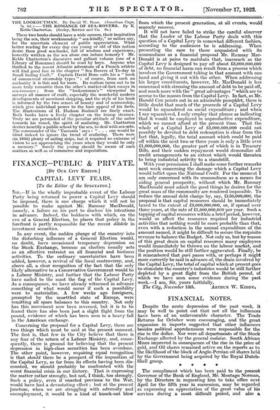FINANCE-PUBLIC & PRIVATE.
[By OUR CITY EDITOR.]
CAPITAL LEVY FEARS.
[To the Editor of the SPECTATOR.] SIR,—If in the wholly improbable event of the Labour Party being returned to power a Capital Levy should be imposed, there is one charge which it will not be possible to make against Mr. Ramsay MacDonald, namely, a failure on his part to disclose his intentions in- advance. Indeed, the boldness with which, on the eve of a General Election, he places that policy in the forefront is partly responsible for the recent debacle in investment securities.
In any event, the sudden plunge of the country. into the disturbing influence of a General Election would, no doubt, have occasioned temporary depression on the Stock Exchange, because an election usually acts as an effective restraint on all financial and business activities. To the ordinary uncertainties have been added, however, a revival of the fiscal controversy, and, above all, a clear recognition of the fact that the only likely alternative to a Conservative Government would be a Labour Ministry, and further that the Labour Party have nailed to the mast the flag, of the- Capital Levy. As a consequence, we have already witnessed in advance. something of what would occur if such a possibility were to materialize. A few weeks ago foreigners, ,prompted by the unsettled state of Europe, were remitting all spare balances to this country. Not only has this movement now been reversed, but it is to be feared there has also been just a slight flight from the pound, evidence of which has been seen in a heavy fall in the American exchange.
Concerning the proposal for a Capital Levy, there are two things which must be said at the present moment. The first is, that few in the City believe that there is any fear of the return of a- Labour Ministry, and, conse- quently, there is ground for believing that the present depression in high-class securities has been overdone. The other point, however, requiring equal recognition is that should there be a prospect of the imposition of the Capital Levy, so far from its effects having been dis- counted, we should probably be confronted with the worst financial crisis, in our history. That is expressing the matter rather strongly, but not, I think,,too strongly. Such a policy, even_ if enacid previous: to the War, would have had a devastating effect ; but at the present juncture, when we are struggling with adversity and unemployment, it would be a kind of knock-out blow from which the present generation, at all events, would scarcely recover.
It will not have failed to strike the careful observer that the Leader of the Labour Party deals with this question of a Capital Levy in somewhat different fashion, according to the audiences he is addressing. When presenting the case to those acquainted with its unsoundness as a financial proposal Mr. Ramsay Mac- Donald is at pains to maintain that, inasmuch as the CapitalL is designed to pay off about 13,000,000,000 of debt, no financial nancial harm can result from a process which involves the Government taking in that amount with one hand and giving it out with the other. When addressing his larger constituents, however, Mr. MacDonald is less concerned with stressing the amount of debt to be paid off, and much more with the" great advantages "which are to accrue to the masses from the Capital Levy. In fact, as Mr. Harold Cox points out in an admirable pamphlet, there is little doubt that much of the proceeds of a Capital Levy would be squandered on social expenditure ; and when I say squandered, I only employ that phrase as indicating that it would be employed in unproductive expenditure, which we cannot afford at the present time. That the whole of a Capital Levy of £3,000,000,000 could not possibly be devoted to debt redemption is clear from the fact that, legally, the total amount which could be paid off within the next two or three years is only a little over £1,000,000,000, the greater part of which is in Treasury Bills, and their sudden repayment would demoralize all credit arrangements to an extent which would threaten to bring industrial activity to a standstill.
With your permission I shall make some further remarks next week- concerning the damage which a Capital Levy would inflict upon the National Credit. For the moment I am only concerned with. its unsoundness as a means for aiding general prosperity, without which Mr. Ramsay MacDonald must admit the good things he desires for the great mass of the community are rendered impossible. To reduce the annual debt charge by, say, £1.50;000;000, the proposal is that capital resources should be immediately taxed to the extent of £9,000,000;000, or, if spread over three years, at the rate of £1,000,000,000 per year. Such a tapping of capital resources within a brief period, however, would so affect the resources required for industrial activities that nothing would be more probable than that, even with a reduction in the annual expenditure of the amount named, it might be difficult to secure the requisite revenue to balance the Budget. Not only so, but by-reason of this great drain on capital resources many employees would iinmediately be thrown on the labour market, and the position would be still further aggravated. Finally, be it remembered that pari, passu with, or perhaps it might more correctly be: saidin advance of, the drain involved by the Capital Levy, the total of capital which at present goes to stimulate the country's industries would be still further depleted by a great flight from the British pound, of which we have seen some evidence during the past week.—I am, Sir, yours faithfully,


























































 Previous page
Previous page